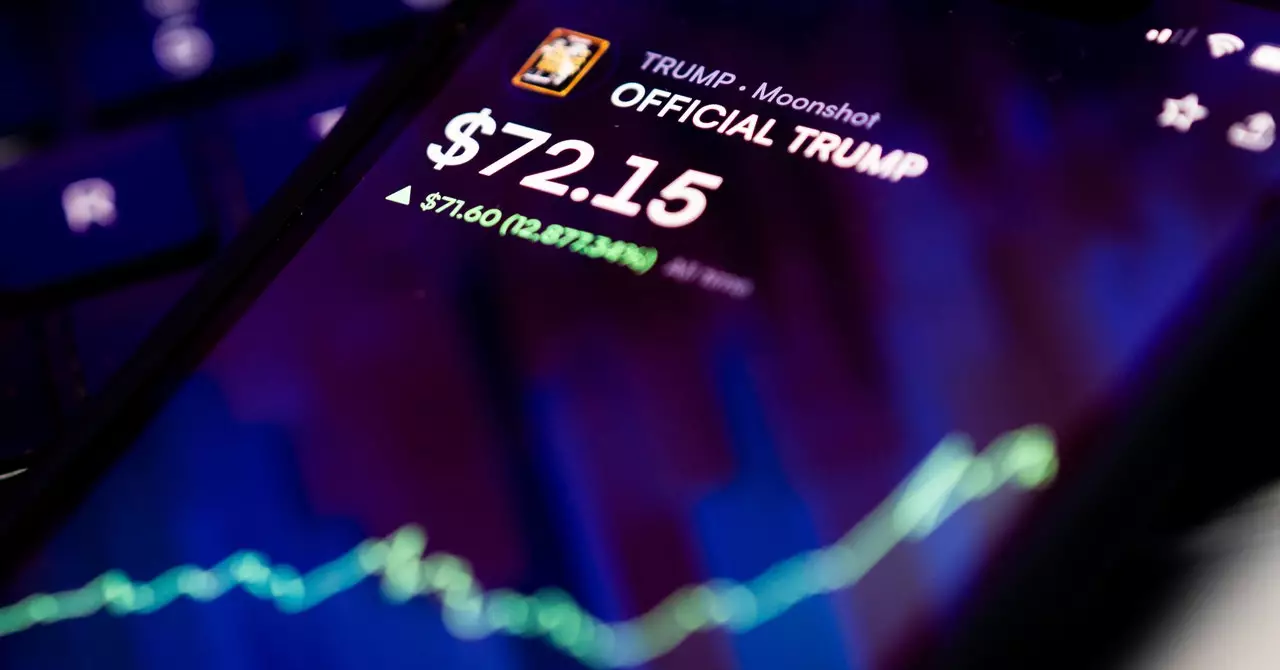The cryptocurrency market is rife with opportunities, risks, and ethical dilemmas. The recent surge of Trump-themed cryptocurrencies, particularly the controversial TRUMP coin and Melania Trump’s own MEM coin, has shed light on the potential hazards and implications of political figures entering the digital currency space. From significant financial repercussions to ethical concerns surrounding ownership and transparency, the landscape is tumultuous, reflecting both the volatile nature of the market and the complex intertwining of politics and finance.
The Risks of Memecoins: An Insider’s Dilemma
The TRUMP coin has been described as reminiscent of classic memecoin schemes characterized by pump-and-dump strategies. Jacob Silverman, coauthor of “Easy Money,” warns that insiders holding a bulk of the coin—80 percent, in this case—pose a substantial risk to unsuspecting investors. This means that while early promoters may profit from price rallies, latecomers often find themselves left with depreciating assets, losing much of their investment. The distinction between legal and illegal pump-and-dump schemes often resides within a grey area, but such tactics are widely viewed as ethically questionable.
Critics like Silverman highlight the stark reality that these events serve as cautionary tales for potential investors. “Unfortunately, some poor saps are going to get soaked,” he asserts, reflecting the harsh consequences of uninformed financial speculation. The inherent risks when large portions of cryptocurrency are controlled by few individuals suggest that the TRUMP token might not be a sound investment, but rather a vehicle for exploitation among those in the know.
Adding another layer of complexity, Melania Trump’s recent launch of her own MEM coin has sent shockwaves through the landscape, leading to a 50% drop in the value of the TRUMP token almost immediately after its announcement. This incident not only underscores the unpredictable nature of cryptocurrency but also the potential fallout for supporters who invested in these memecoins as a form of political expression. A plethora of unofficial tokens like MAGA, Super Trump, and Doland Tremp have similarly experienced declines, revealing the volatility of these niche currencies tethered to political allegiance.
Steven Steele, marketing director for the MAGA token, voiced his discontent regarding Melania Trump’s move, describing it as “an egregious money grab.” This sentiment exemplifies a broader concern that the intertwining of politics and memecoins might lead to disillusionment among supporters who view these tokens as legitimate representations of their political beliefs.
Bribery, Influence, and Ethical Concerns
Beyond the financial detriment lies a worrying ethical dimension. Silverman suggests that these political cryptocurrencies could act as avenues for bribery, where actors can inflate their value in ways that create subtle influences on political figures. By investing in these coins, financially motivated individuals may seek to gain favor and leverage over those in power without direct transactions, creating ethical concerns that extend beyond mere investments.
Such a mechanism poses a unique challenge to political integrity. It’s not merely a matter of hype and abstraction anymore; it raises crucial questions about influence, power dynamics, and the very nature of political fundraising. The landscape grows ever murkier when trust in political leaders is so closely linked to financial instruments and speculative practices.
Former President Donald Trump’s shifting stance on cryptocurrency—from outright denouncement to embracing the label of “crypto president”—illustrates a nuanced, if not opportunistic, relationship with the burgeoning crypto industry. His rhetoric aims to position the United States at the forefront of the cryptocurrency revolution, potentially reshaping regulatory frameworks to adapt to this digital financial landscape. Yet, the proposed changes from his potential reelection may reflect more of a personal agenda than genuine reform.
Alongside his assertions at cryptocurrency conferences, the Trump family’s recent foray into launching World Liberty Financial underscores a burgeoning trend where political figures are simultaneously establishing businesses and promoting policy agendas. Critics urge caution, warning that if projects like the TRUMP coin or World Liberty Financial falter, the fallout could inflict severe harm on investor confidence and the reputation of political figures involved.
The emergence of politically themed cryptocurrencies signals both an opportunity and a perilous journey for investors and political constituents alike. As the lines between finance, politics, and ethical boundaries blur, a growing wave of skepticism emerges regarding the motives behind such financial instruments. In navigating this new frontier, investors must exercise caution and cultivate critical awareness of the potential ramifications that these coins may entail—both financially and ethically.

